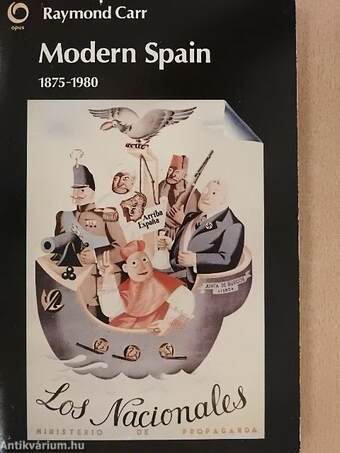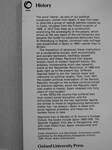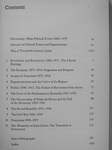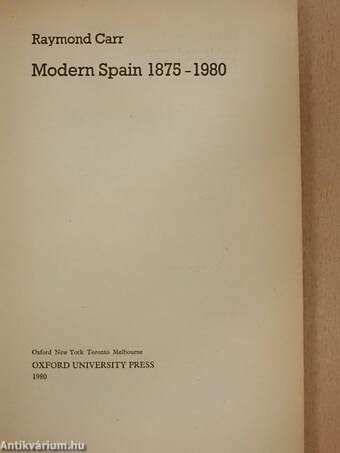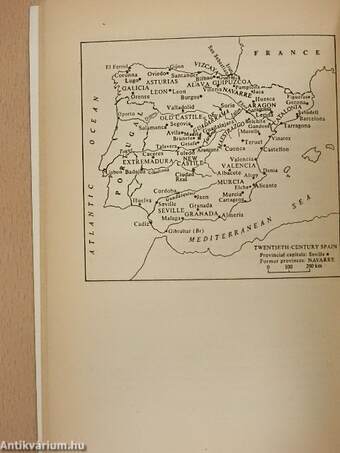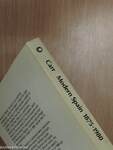1.067.681
kiadvánnyal nyújtjuk Magyarország legnagyobb antikvár könyv-kínálatát

VISSZA
A TETEJÉRE
JAVASLATOKÉszre-
vételek
Modern Spain 1875-1980
| Kiadó: | Oxford University Press |
|---|---|
| Kiadás helye: | Oxford |
| Kiadás éve: | |
| Kötés típusa: | Ragasztott papírkötés |
| Oldalszám: | 201 oldal |
| Sorozatcím: | Opus History |
| Kötetszám: | |
| Nyelv: | Angol |
| Méret: | 20 cm x 13 cm |
| ISBN: | 0-19-289090-5 |
| Megjegyzés: | Néhány fekete-fehér ábrával. |
naponta értesítjük a beérkező friss
kiadványokról
naponta értesítjük a beérkező friss
kiadványokról
Fülszöveg
o History
{ opus
The word 'liberal', as part of our political vocabulary, comes from Spain. It was first used to describe a group of radical patriots cooped up in Cadiz, refugees from the French invasion of 1808. In 1812 they drew up a constitution ; enshrining the sovereignty of the people, which
struck at the very basis of the old monarchy and became the model for advanced democrats from St Petersburg to Naples. Universal male suffrage ! was established in Spain in 1890—earlier than in
Britain.
The imposition of advanced liberal institutions on a conservative society, both economically and socially backward, inevitably caused tensions; and these, Raymond Carr argues, explain much of modern Spanish history. His analysis, incorporating much new research, starts at the 'September Revolution' of 1868 and goes right up to the present day. Different regimes failed to win the 'neutral mass' and overcome its political apathy. Then, from 1931, the sudden political mobilization of... Tovább
Fülszöveg
o History
{ opus
The word 'liberal', as part of our political vocabulary, comes from Spain. It was first used to describe a group of radical patriots cooped up in Cadiz, refugees from the French invasion of 1808. In 1812 they drew up a constitution ; enshrining the sovereignty of the people, which
struck at the very basis of the old monarchy and became the model for advanced democrats from St Petersburg to Naples. Universal male suffrage ! was established in Spain in 1890—earlier than in
Britain.
The imposition of advanced liberal institutions on a conservative society, both economically and socially backward, inevitably caused tensions; and these, Raymond Carr argues, explain much of modern Spanish history. His analysis, incorporating much new research, starts at the 'September Revolution' of 1868 and goes right up to the present day. Different regimes failed to win the 'neutral mass' and overcome its political apathy. Then, from 1931, the sudden political mobilization of the Second I Republic brought to the surface conflicts buried
I by previous regimes, which the Republic itself
was unable to master. Spain relapsed into forty years of'iron surgery'.
In the 1970s the country has suffered less t from violent social disruption, and the
' difficulties faced by the new legitimate regime
are similar to those of neighbouring democratic I states; but—as always—Spain is beset with
i' acute regional problems, and these are the
I' hardest fence to take.
) Raymond Carr is Warden of St Antony's College,
,! Oxford. His books include Spain 1808-1939, The
Spanish Tragedy: Civil War in Perspective, and, with Juan Pablo Fusi, Spain: Dictatorship and I, Democracy.
a
Cover illustration: Los Nacionales. Anonymous poster publistied by the Republican propaganda ministry, 1936. Photo: Snark International.
Oxford University Press Vissza
Témakörök
- Idegennyelv > Idegennyelvű könyvek > Angol > Történelem > Európa története > Egyéb
- Történelem > Idegennyelvű > Angol
- Történelem > Legújabb kor > Egyéb
- Történelem > Kontinensek szerint > Európa, európai országok története > Dél-Európa > Spanyolország
- Történelem > Monográfiák > Világtörténelem
- Történelem > Újkor > Egyéb



